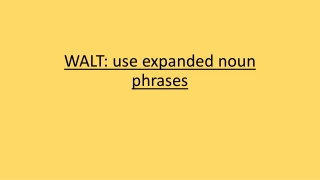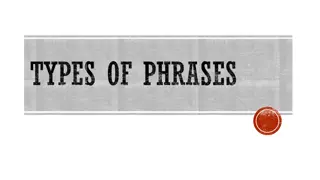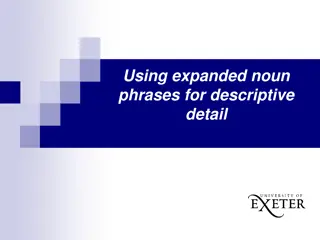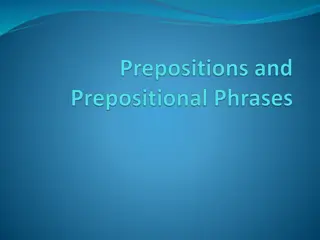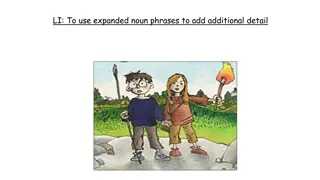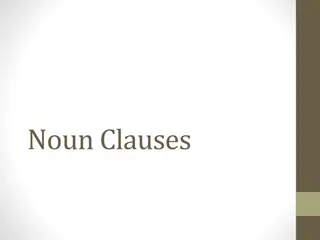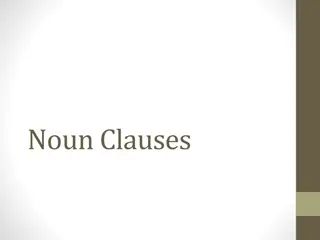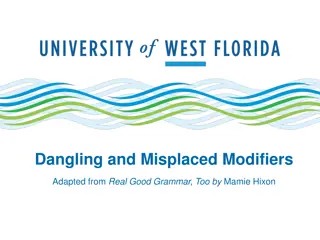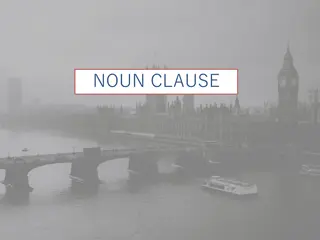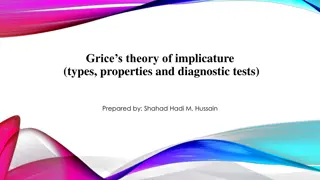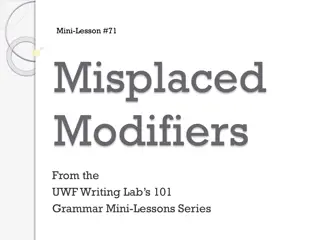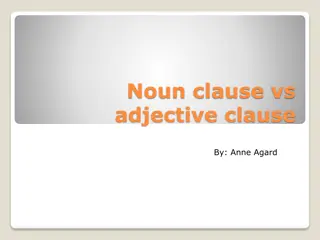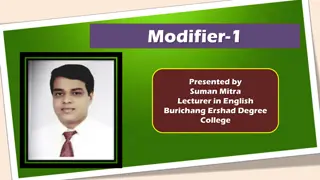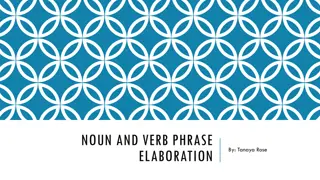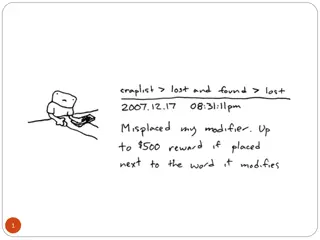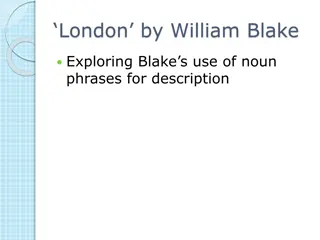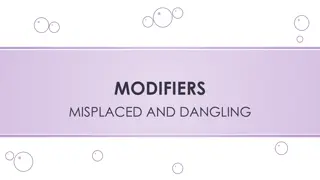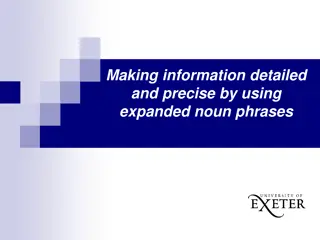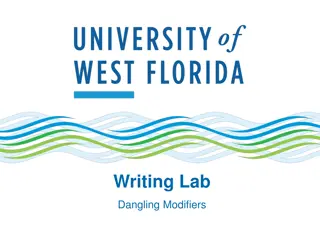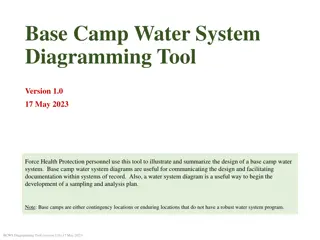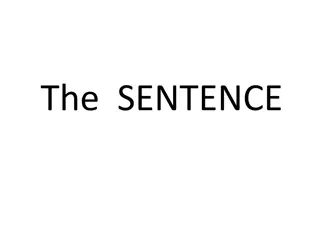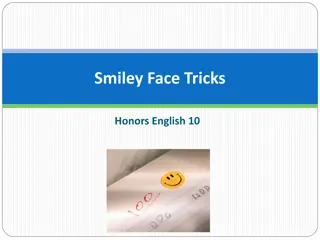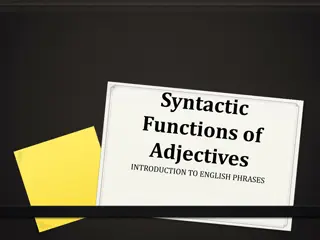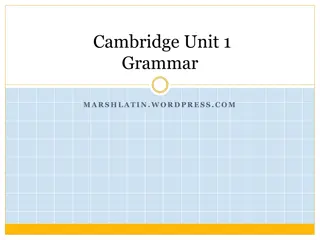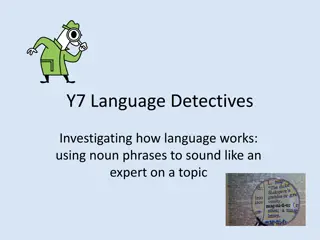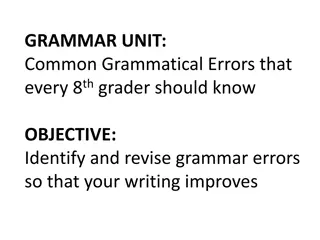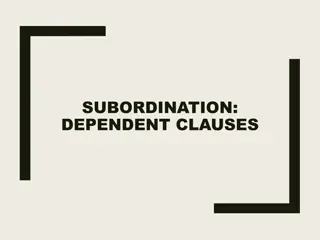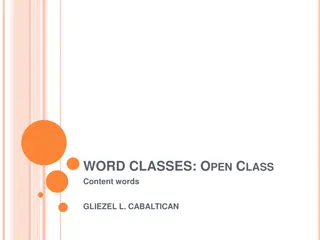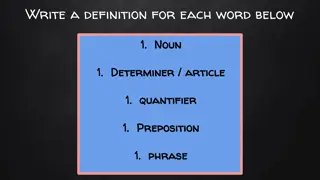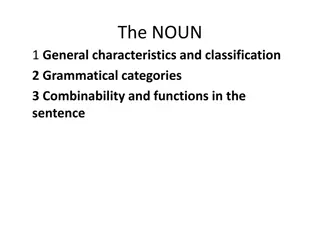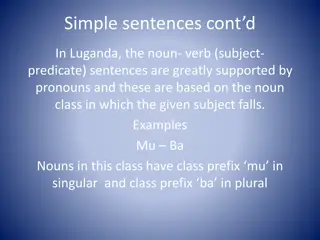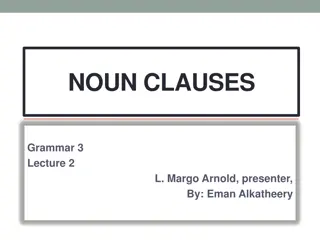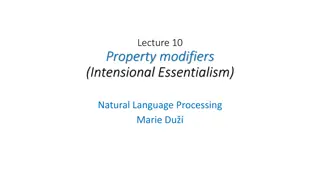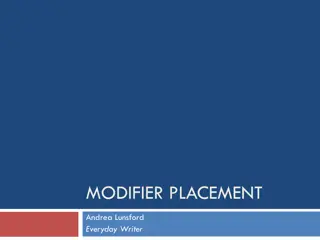WALT: use expanded noun phrases
Write expanded noun phrases using adjectives to describe Macbeth's appearance, characteristics, and surroundings. Enhance your writing skills with vivid details.
0 views • 5 slides
Understanding Different Types of Phrases in English Grammar
Explore the various types of phrases in English grammar, including noun phrases and adjectival phrases. Learn how modifiers can come before or after the noun in a phrase, and practice identifying these phrases in sentences. Enhance your understanding of grammar with clear examples and explanations.
1 views • 12 slides
Exploring Descriptive Detail Through Expanded Noun Phrases
Delve into the art of using expanded noun phrases for descriptive richness in writing, as showcased through authentic texts and engaging discussions. Uncover how these linguistic choices bring life to descriptions, enhance imagery, and spark creativity in readers' minds.
0 views • 6 slides
Understanding Prepositions and Prepositional Phrases
Prepositions are words that connect nouns or pronouns to other words in a sentence, indicating time or direction. Prepositional phrases include a preposition, its object (a noun or pronoun), and modifiers for that object. They act as adverbs, describing when, where, or how things happen. Examples an
0 views • 7 slides
Enhancing Descriptions with Expanded Noun Phrases
Learn how to transform simple noun phrases into detailed descriptions by adding adjectives to create expanded noun phrases. Explore examples and engage in an activity to practice using expanded noun phrases to describe characters effectively.
0 views • 6 slides
Understanding Noun Clauses: Examples and Usage
A clause is a group of words with a subject and a verb, while a phrase lacks a subject and verb. Noun clauses, which function as nouns, can be subjects, objects of verbs or prepositions, and complements. They often begin with question words like what, when, or why. Examples illustrate their usage in
2 views • 49 slides
Understanding Noun Clauses in English Grammar
A clause is a group of words with a subject and a verb, while a phrase lacks one. Independent clauses can stand alone, while dependent clauses cannot. Noun clauses function as nouns in a sentence, serving different roles like subjects, objects, prepositional objects, and complements. They can start
1 views • 49 slides
Understanding Adjectivals in Noun Phrases: A Comprehensive Guide
Adjectivals, including determiners, adjectives, and nouns, play crucial roles in modifying nouns within noun phrases. This guide explores the different types of adjectivals, their positions within a phrase, the use of pre-headword modifiers such as determiners, and the order of adjectives and nouns.
1 views • 40 slides
Understanding Noun Clauses in English Grammar
A clause is a group of words with a subject and verb, while a phrase lacks one. Noun clauses, functioning as nouns, serve various roles in sentences. They can be subjects, objects of verbs/prepositions, or complements. Starting with question words like what, when, or why, these clauses mirror statem
0 views • 49 slides
Understanding and Correcting Modifiers in Writing
Learn about modifiers, including dangling, misplaced, and squinting modifiers, with examples and tips on how to revise sentences to avoid these errors. Improve your writing by understanding how modifiers impact sentence clarity and meaning.
0 views • 10 slides
Understanding Noun Clauses and Their Functions
A clause is a group of words containing a subject and predicate forming part of a sentence. Noun clauses act as nouns in a sentence and can function in various ways, such as being the subject or object of a verb, participle, or preposition. They are identified by asking "who" or "what" questions and
0 views • 23 slides
Grice's Theory of Implicature: Types, Properties, and Diagnostic Tests
Grice's theory of implicature distinguishes between types of implicatures - conventional and conversational. Conversational implicatures are context-dependent and motivated by conversational maxims, leading to generalized and particularized implicatures. Generalized conversational implicatures are d
0 views • 18 slides
Understanding Misplaced Modifiers in Grammar
Misplaced modifiers can lead to confusion in writing. Learn how to correctly position adjectives, adverbs, phrases, and clauses to ensure clear and effective communication in your sentences. Avoid common errors like split infinitives and squinting modifiers for improved writing quality.
0 views • 7 slides
Understanding Adjective Clauses and Noun Clauses in English Grammar
Learn the key differences between adjective clauses and noun clauses in English grammar. Adjective clauses describe nouns, while noun clauses take the place of a noun in a sentence, serving as either the subject or object of a verb. Discover how to identify and use these clauses effectively through
0 views • 10 slides
Mastering the Art of Modifiers in English Language
Explore the rules and examples of pre-modifiers and post-modifiers in English grammar, including modifying nouns with adjectives, determiners, demonstratives, possessives, quantifiers, articles, verb forms, appositives, present participles, and infinitive phrases. Enhance your understanding of how t
0 views • 8 slides
Understanding Grammatical Development in Speech-Language Pathology
Explore a broader perspective of grammatical development in speech-language pathology focusing on noun and verb phrase elaboration. Learn about identifying and elaborating noun phrases, substitution tests, and the elements of an elaborated noun phrase. Gain insights into clinical approaches and lang
0 views • 28 slides
Understanding Modifiers in Grammar
Explore the world of modifiers in grammar through this informative content. Learn about different types of modifiers, examples of misplaced and dangling modifiers, and how to correct common grammatical errors. Enhance your understanding of how modifiers can enhance or change the meaning of a sentenc
0 views • 14 slides
Analysis of William Blake's Use of Noun Phrases in "London
Exploring William Blake's poem "London," this analysis focuses on the use of noun phrases to describe people, places, objects, and emotions. By examining the nouns chosen by Blake and the patterns they form, we gain insight into the vivid and evocative imagery he creates. The expanded noun phrases i
1 views • 4 slides
Understanding Modifiers: Misplaced, Dangling, and Adverb Placement
Learn about the concepts of misplaced modifiers, dangling modifiers, and adverb placement through clear examples and explanations. Practice fixing sentences with modifier errors and enhance your writing skills. Access additional practice resources to strengthen your understanding and application of
0 views • 7 slides
Enhancing Writing Through Detailed Noun Phrases
Explore the LEAD principles for connecting grammar with meaning and rhetorical effect in writing. Authentic texts are utilized to engage learners in deep metalinguistic learning. An interactive activity challenges readers to match descriptions with marine creatures based on detailed noun phrases. De
1 views • 6 slides
Mastering Dangling Modifiers in Writing
Dangling modifiers occur when the noun or idea being modified is missing from the sentence. This leads to confusion or unintended meanings. Learn how to identify and correct dangling modifiers with examples and revisions. Improve your writing clarity and precision by mastering this common grammar is
0 views • 4 slides
Understanding Adjectives and Adverbs as Modifiers in English
Explore the role of adjectives and adverbs as modifiers in English language. Learn how adjectives describe nouns and pronouns, while adverbs modify adjectives, verbs, or other adverbs to show how, where, when, or to what degree an action is done. Understand the difference between adjectives and adve
0 views • 21 slides
Base Camp Water System Diagramming Tool
This tool, designed for Force Health Protection personnel, aids in illustrating and summarizing base camp water system designs. It facilitates communication, documentation, and the development of sampling plans. Users can create water system diagrams using provided icons and modifiers. The tool incl
0 views • 14 slides
Mastering the Art of Writing: Sentence Structure, Errors, and Phrases as Modifiers
Understanding the fundamentals of quality sentence writing is essential for effective communication. Explore the significance of proper sentence structure, common errors to avoid, and the use of phrases as modifiers to enhance your writing skills. Master the art of crafting clear, concise, and engag
0 views • 9 slides
Writing Tips and Techniques for Honors English 10
Enhance your writing skills with these creative techniques for adding humor, poetic rhythms, hyphenated modifiers, and repetition for effect to your paragraphs. Inject humor to keep readers engaged, create magic with three parallel groups of words, and use hyphenated modifiers for sophistication. Ex
0 views • 14 slides
Understanding Different Types of Adjective Functions in English Grammar
Learn about attributive adjectives that modify nouns, predicative adjectives used with linking verbs, post-modifiers like reduced clauses, adjectives acting as the head of a noun phrase, verbless adjective clauses, and exclamatory adjective sentences in English grammar.
0 views • 7 slides
Understanding Latin Noun Cases and Declensions
Explore the use and distinctions of Latin noun cases (Nominative, Genitive, Dative, Accusative, Ablative), along with the concept of declensions, genders, numbers, and cases. Learn how to determine the declension, gender, number, and case of a Latin noun through its endings, and delve into examples
0 views • 23 slides
Understanding English Phrase Structure: Analysis and Examples
Explore the morphosyntactic analysis of English phrases and the grammatical hierarchy, delving into sentence constituents, clauses, phrases, words, and morphemes. Learn about different types of phrases, their structures, and elements like modifiers, headwords, and grammatical markers, with illustrat
0 views • 30 slides
Mastering Noun Phrases for Expertise in Language
Explore the power of crafting precise noun phrases to elevate your expertise on any topic. Unveil the secrets of using nouns strategically to convey depth and authority in your writing. Dive into the world of language detectives and uncover the nuances of language through the lens of noun phrases. E
0 views • 10 slides
Grammar Unit: Common Grammatical Errors & Dangling Modifiers
Learn about common grammatical errors such as misplaced modifiers and dangling modifiers in this educational unit designed to help 8th graders identify and revise errors to enhance their writing. Examples and explanations provided guide readers to improve their grammar skills and avoid ambiguity in
0 views • 13 slides
Mastering Dangling Modifiers: Examples, Definitions, and Fixes
Understanding dangling modifiers with examples, a clear definition, and practical fixes to rearrange sentences correctly. Learn how to identify and correct these common grammatical errors for better writing skills.
0 views • 8 slides
Understanding Subordination in Grammar
Subordination in grammar involves dependent clauses that are not independent. These subordinate clauses play three main roles in a sentence: adverbial, adjectival, and nominal. Adverbial clauses provide information on time, manner, place, condition, reason, and purpose. Adjectival clauses act as mod
0 views • 26 slides
Understanding Word Classes and Noun Functions in Grammar
Explore the concept of word classes such as open class and minimum free form, structural vs traditional grammar, count abstract vs concrete nouns, noun phrase extensions, properties of nouns, and noun functions in language. Enhance your understanding of adjectives, determiners, prepositions, and var
0 views • 28 slides
Understanding Noun Phrases: Definitions and Examples
Noun phrases are essential components of language that consist of a noun and other words that describe or modify it. This article provides definitions for key terms related to noun phrases, such as nouns, determiners, quantifiers, prepositions, adjectives, and adverbs. Examples and images help illus
0 views • 12 slides
Understanding the Noun: Characteristics, Classification, and Functions
The noun is a fundamental part of speech expressing various concepts such as names of objects, living beings, places, materials, processes, and more. It is characterized by semantic features, formal criteria including derivational features, grammatical categories like number and gender, and combinab
0 views • 18 slides
Luganda Noun-Verb Sentences and Pronouns
Explore Luganda noun-verb sentence structures supported by pronouns based on noun classes, specifically Mu-Ba and Mu-Mi, with examples showcasing singular and plural forms. Learn how to construct simple sentences using various nouns in these classes.
0 views • 6 slides
Understanding Noun Clauses in Grammar
Noun clauses are dependent clauses that act as nouns in sentences, serving as subjects, verb objects, prepositional objects, and complements. They should not be separated from main clauses with punctuation. Noun clauses can appear at the beginning of a sentence or after certain nouns, adjectives, an
0 views • 77 slides
Understanding Property Modifiers in Natural Language Processing
Exploring different types of property modifiers like intersective, subsective, privative, and modal, along with examples and explanations of paradoxes in language. The major differences between subsective and intersective modifications are discussed, highlighting the distinctions in their logical im
0 views • 30 slides
Understanding Modifiers in English Grammar
Exploring the concept of modifiers in English grammar, this content covers the definition of modifiers, types based on position and modified words, common terms used as modifiers such as determiners, adjectives, adverbs, and participles. Gain insights into pre-modifiers, post-modifiers, and how modi
0 views • 12 slides
Understanding Modifier Placement in Writing
The importance of correct modifier placement in writing is highlighted through examples of misplaced, limiting, squinting, disruptive, and dangling modifiers. Learn how to keep modifiers close to the words they modify, avoid disrupting sentence connections, and prevent dangling modifiers that modify
0 views • 8 slides
